 Strategies to Overcome Constipation on Keto
Strategies to Overcome Constipation on Keto
Okay, so you’ve started a ketogenic diet and things are going great. You’ve lost weight and you feel great, but there’s one thing throwing you off.. you can’t poop. This is more common than you think and actually quite easy to fix if you know what causes it. The path to overcome constipation on keto is usually a matter of changing a few small things you do on a daily basis.
In addition to ways you can overcome constipation on keto for good, there are ways to stimulate a bowel movement when you feel like you haven’t gone in a while and just need a little relief. Because regular bowel movements are so important for overall health, it is important to keep track of their frequency and adjust our eating habits accordingly.
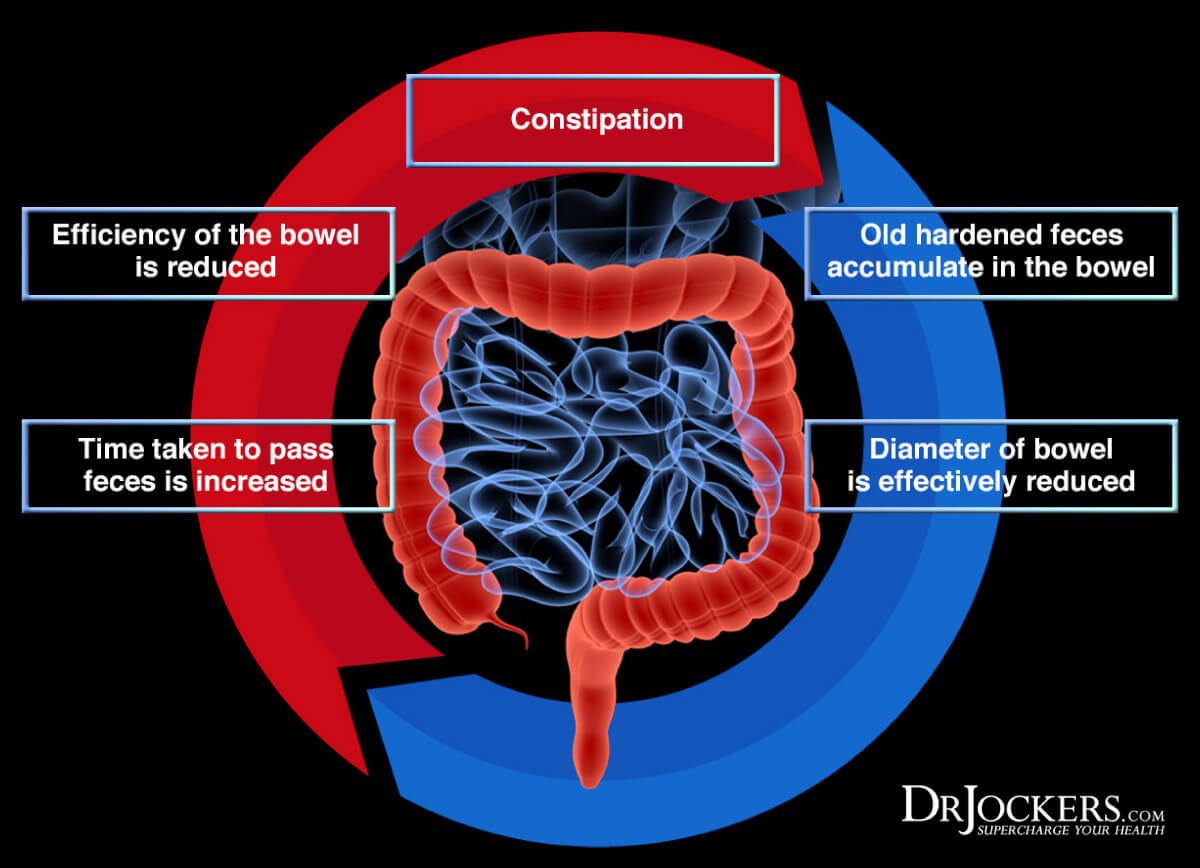
What Qualifies as Constipation
Before we can talk about how to overcome constipation, it is important to understand what actually qualifies. If you are not having 1 or 2 bowel movements daily, I would consider this as less than ideal. It is important to understand why having regular bowel movements is necessary for good health. Additionally, these movements should resemble something along the lines of the type 4 stool pictured below.
When digested food remains in the colon for too long, it can feed unwanted microbes and create a toxic environment. As unpassed waste sits in the colon, it can putrefy and create toxic byproducts that are reabsorbed into the body, causing things like inflammation, brain fog, and low energy.
Additionally, the stress that this situation causes on the body may prevent an optimal state of ketosis. This is because it has the potential to stimulate cortisol responses in the body that stimulate the release of sugar into the blood, taking you out of ketosis.
Constipation on keto is not just unpleasant, but it is also counterproductive to what you are trying to achieve. It is imperative that you find what works for your body to overcome constipation.
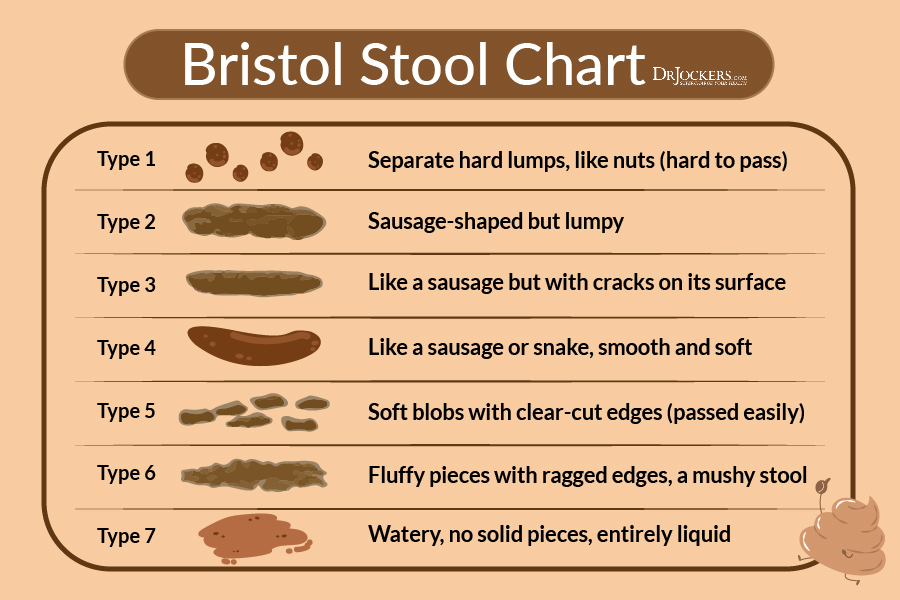
Why Someone Can Have Constipation on Keto
When someone asks what they can do to relieve their constipation on keto it really depends what is causing it. It could be one thing or it could be a number of things that need to be addressed. Additionally, there are simple things you can do to provide symptomatic relief, however if the underlying cause is not addressed it will continue to occur.
The following are common reasons why someone may be experiencing constipation on a ketogenic diet.
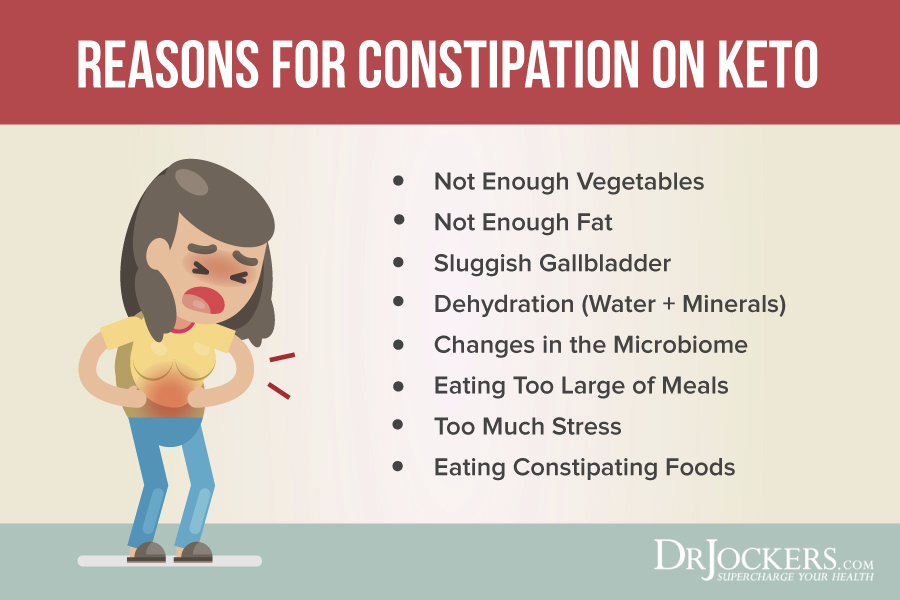
Not Enough Vegetables
A common misconception and cause of constipation on keto is that the bulk of calories comes from meats and animal fats. The way I teach it, there is actually a heavy emphasis on fibrous vegetables and healthy fats from animal sources, but also from avocados, coconut products, and olives.
What these all have in common is that they are great sources of fiber and healthy fats. Fiber helps to add substance to the colon while the healthy fats almost act as a lubricant in the colon. Both together ensure healthy and regular bowel movements.
Dietary fiber is important for beneficial fermentation processes that favor bacteria like Lactobacilli and Bifidobacteria. These bacteria have a pro-motility effect on the gut, meaning they promote more regular bowel movements (1).
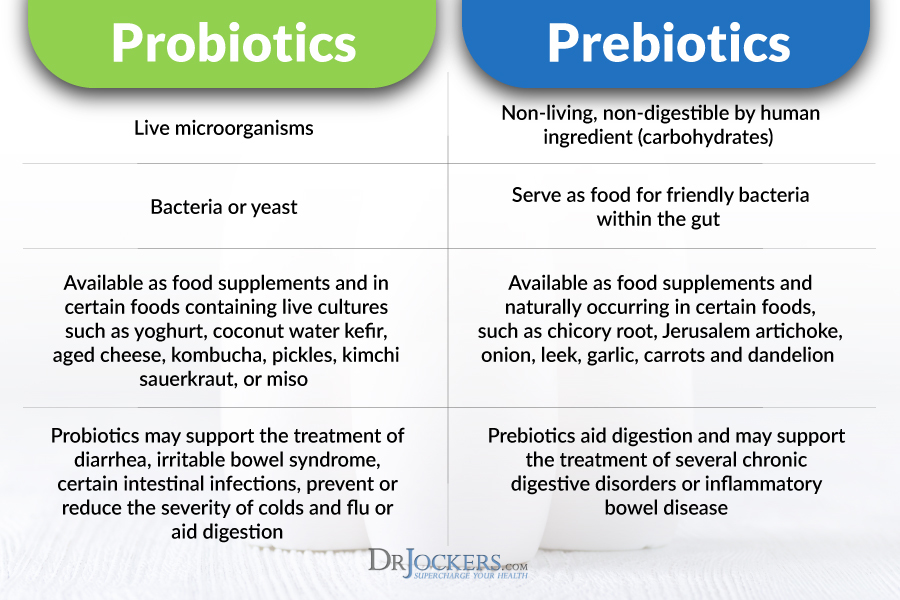
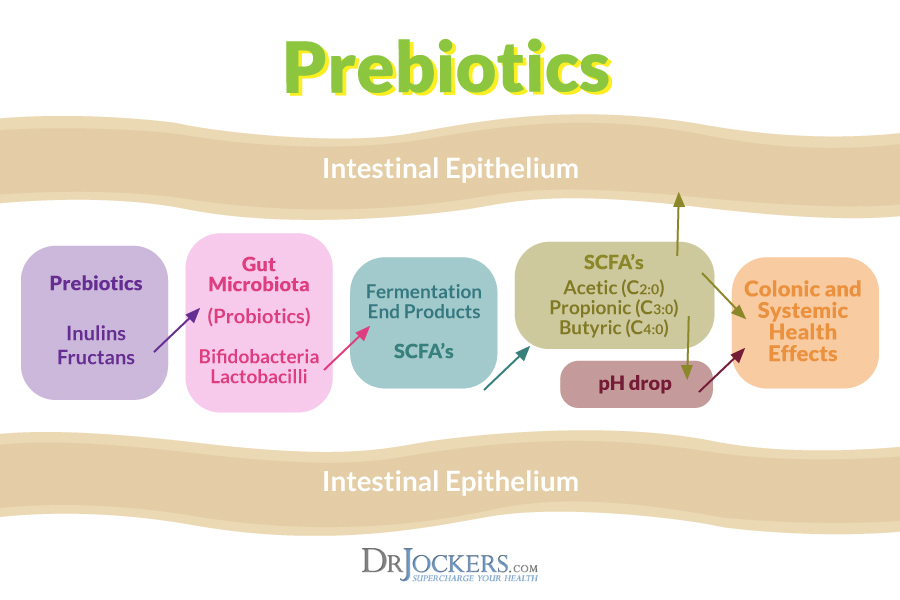
Solution: More Prebiotic Fiber
This solution is pretty straight forward, simply increase your intake of fibrous vegetables. This will ensure you have fiber to add bulk to your stools and feed the beneficial bacteria in the gut. These actions combined will go a long way in supporting optimal bowel movements and gut health in general.
Some of the best foods for this are outlined in the graphic below.
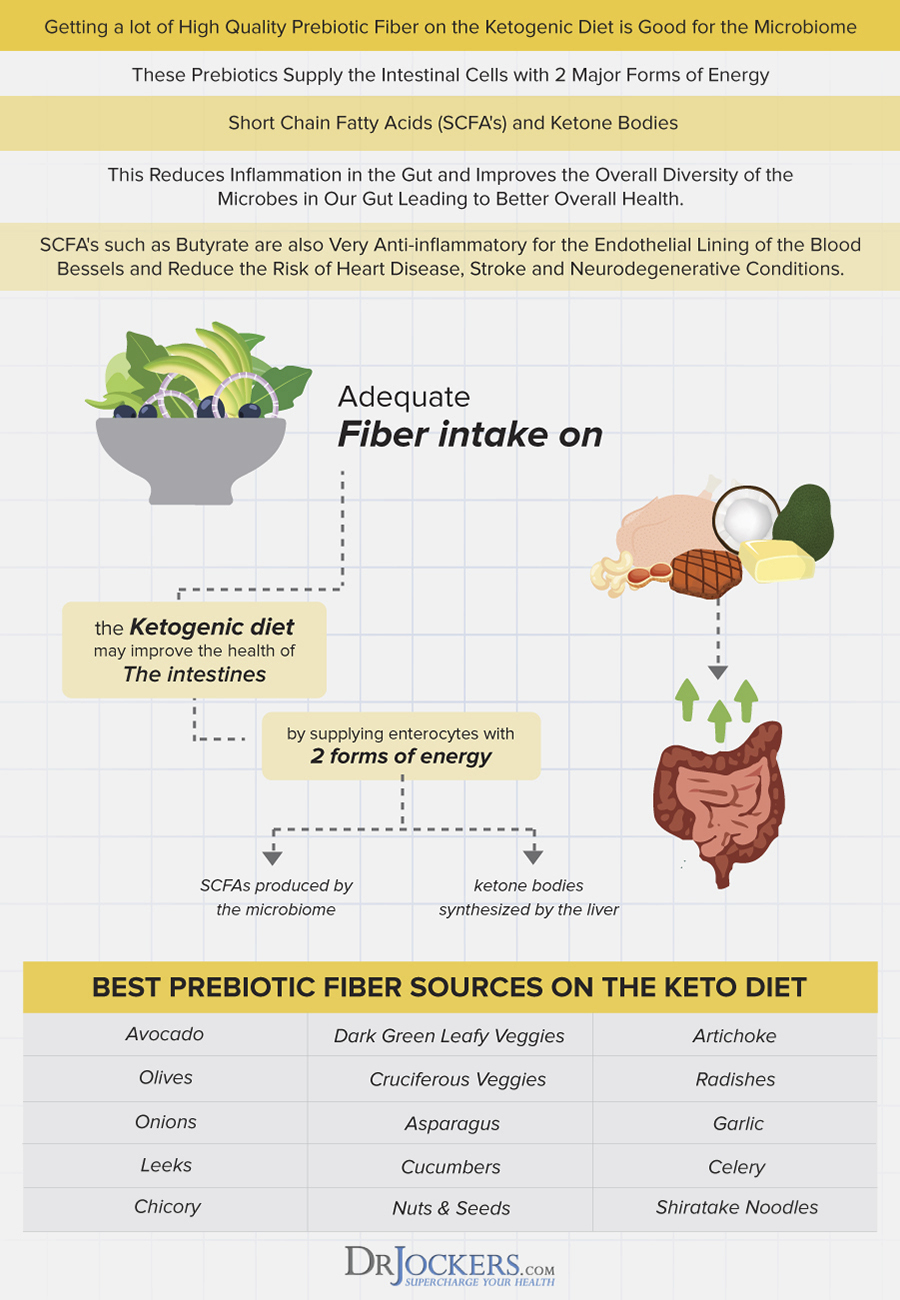
Not Enough Fat
As mentioned already, not eating enough fats can be a contributing factor for constipation on keto. Although it was a small sample size, a recent study investigated a high-fat vs low-fat diet and its relationship to bowel movements. What they found was that those on a high-fat diet had significantly quicker bowel transit times (2).
In fact, this is a very common mistake that people make on a ketogenic diet in general. Not eating enough fats will not only contribute to constipation, but it will also inhibit your ability to burn fat. In my experience, simply increasing dietary fat intake can make a big difference in bowel movements and energy levels.
Solution: Increase Healthy Fat Intake
Increasing your fat intake is simple. This does not mean you can reach for any kind of fat source, however. Ideally, you want to go for healthy fats like coconut oil, avocados, grass-fed butter, and olive oil.
Butter has the added benefits of butyrate and conjugated linoleic acid (CLA). Butyrate is helpful for nourishing the beneficial bacteria in the gut while also helping to support a healthy gut lining. CLA is a super fat burning nutrient that can assist in supporting an optimal state of ketosis.
As another great strategy, it can be extremely helpful to add MCT oil to your daily nutrition plan. MCT is the isolated components of coconut oil that are powerful for helping the body makes ketones for energy. They also act as a natural laxative to overcome constipation.
Start with 1 teaspoon at a time and increase your intake to several tablespoons daily over a span of several weeks. Too much MCT oil at once can cause diarrhea in some individuals.
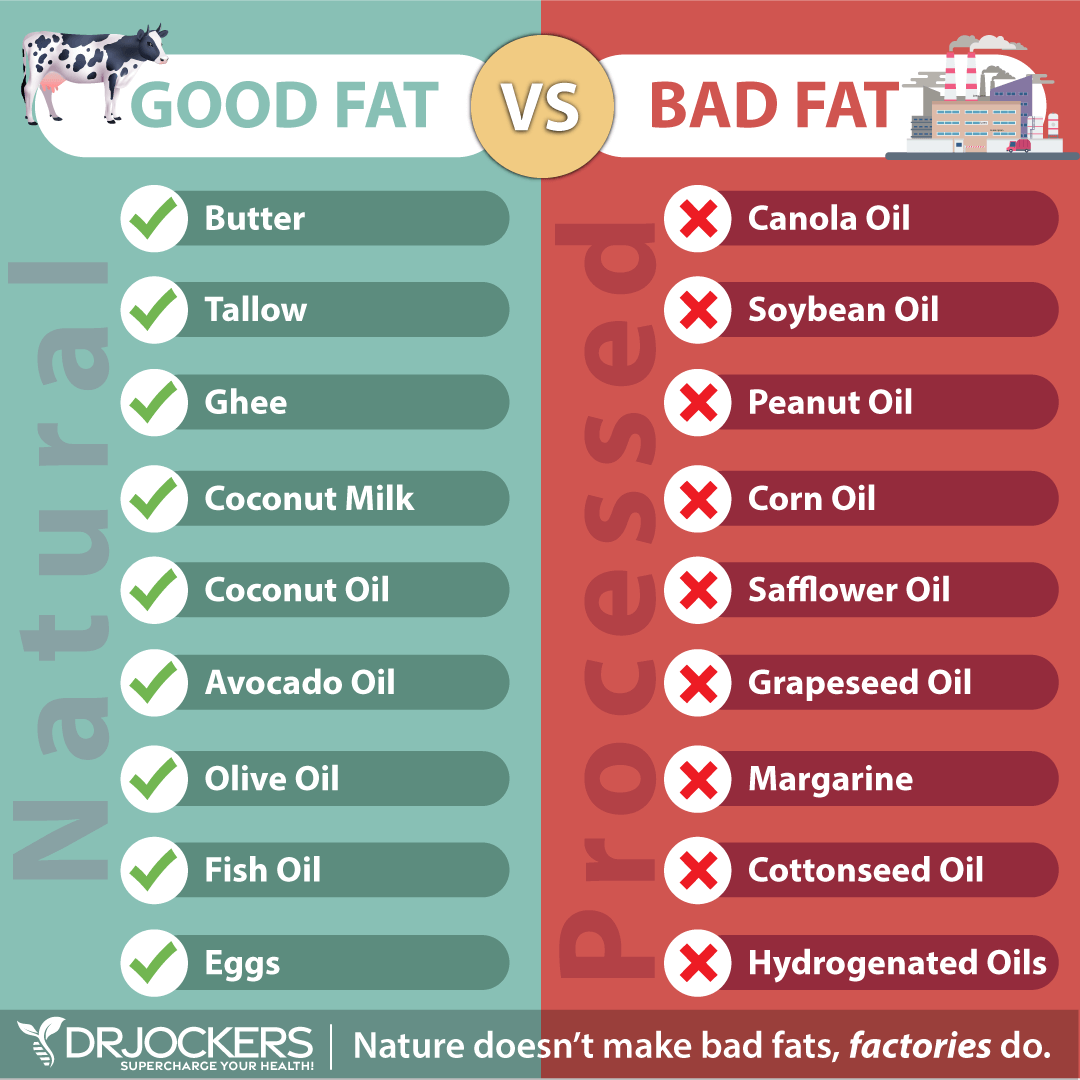
Sluggish Gallbladder
If you are eating plenty of healthy fats and fiber and still having inconsistent bowel movements, it may be a digestion issue. Some people will feel like they have a brick sitting in their stomach after consuming a high-fat meal. When this is the case, it is usually either an issue with low stomach acid or a sluggish gallbladder.
Symptoms of Low Stomach Acid Include:
Heartburn, bloating, cramping, indigestion, gas, protein and nutrient deficiencies
Symptoms of Poor Gallbladder Function Include:
Nausea after high-fat meal, pain between the shoulder blades, upper right quadrant pain, itchy skin, constipation and diarrhea, light colored stools
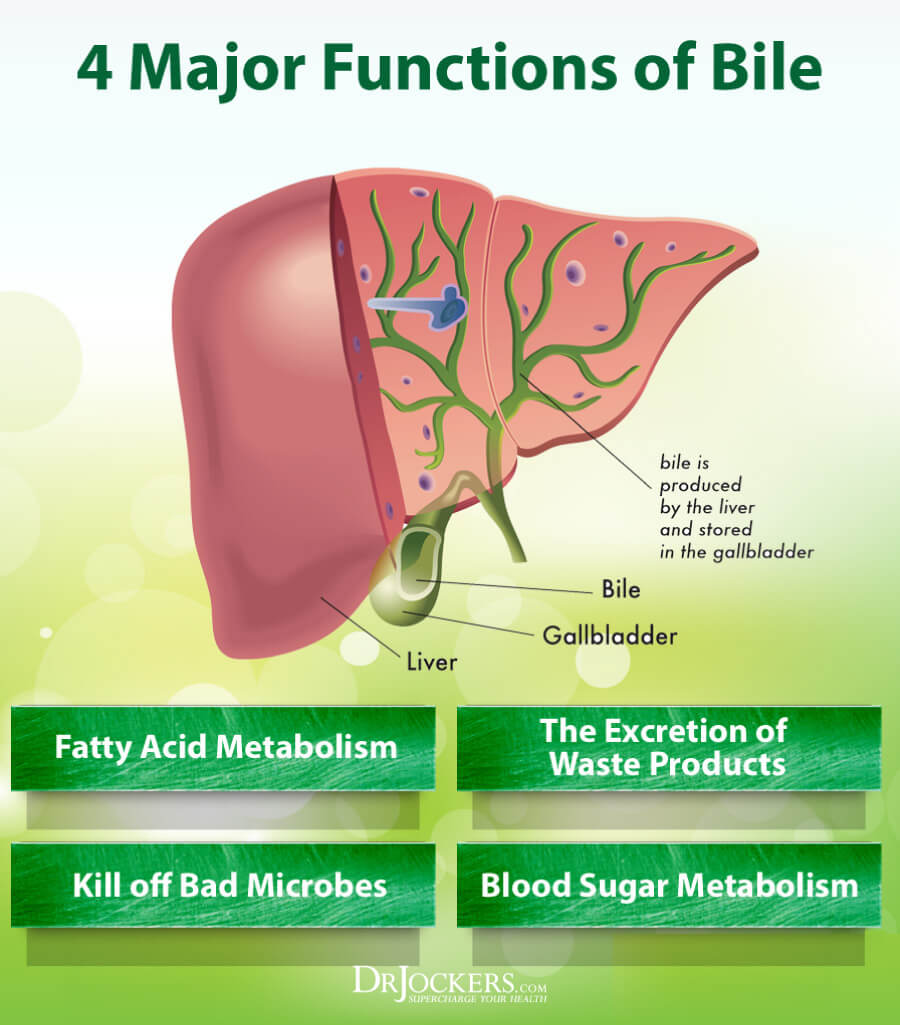
Solution: Strategies to Optimize Digestion
Digestive issues are very common in today’s society. Using the following strategies may be helpful for optimizing digestion and supporting healthy bowel movements to overcome constipation on keto.
Stomach Acid
If you have any of the symptoms of low stomach acid outlined above and get a positive result on the baking soda test, it is a good idea to support stomach acid production. One simple way to do this is to consume 2-4 ounces of apple cider vinegar in a small glass of water 15 minutes before meals.
You will also want to avoid drinking liquids around meal times. A good rule to follow is to stop drinking at least 30 minutes before meals and refrain from drinking at least an hour after meals to allow your stomach acid to perform its job effectively.
Liver & Gallbladder Health
The liver and gallbladder produce and secrete bile as food is released from the stomach to help emulsify dietary fats for digestion. When bile production is sluggish, this aspect of digestion is inhibited and can cause many different symptoms as outlined above.
If you feel like you are having a hard time digesting meals with high amounts of fat, it is a good idea to consume smaller meal portions throughout the day in addition to using bile stimulating foods such as: beets, radishes, artichokes, asparagus, lemons, limes, and apple cider vinegar.
Additionally, herbs like ginger, cilantro, turmeric, cumin, fennel, mint, milk thistle, and parsley are also great liver and gallbladder support.
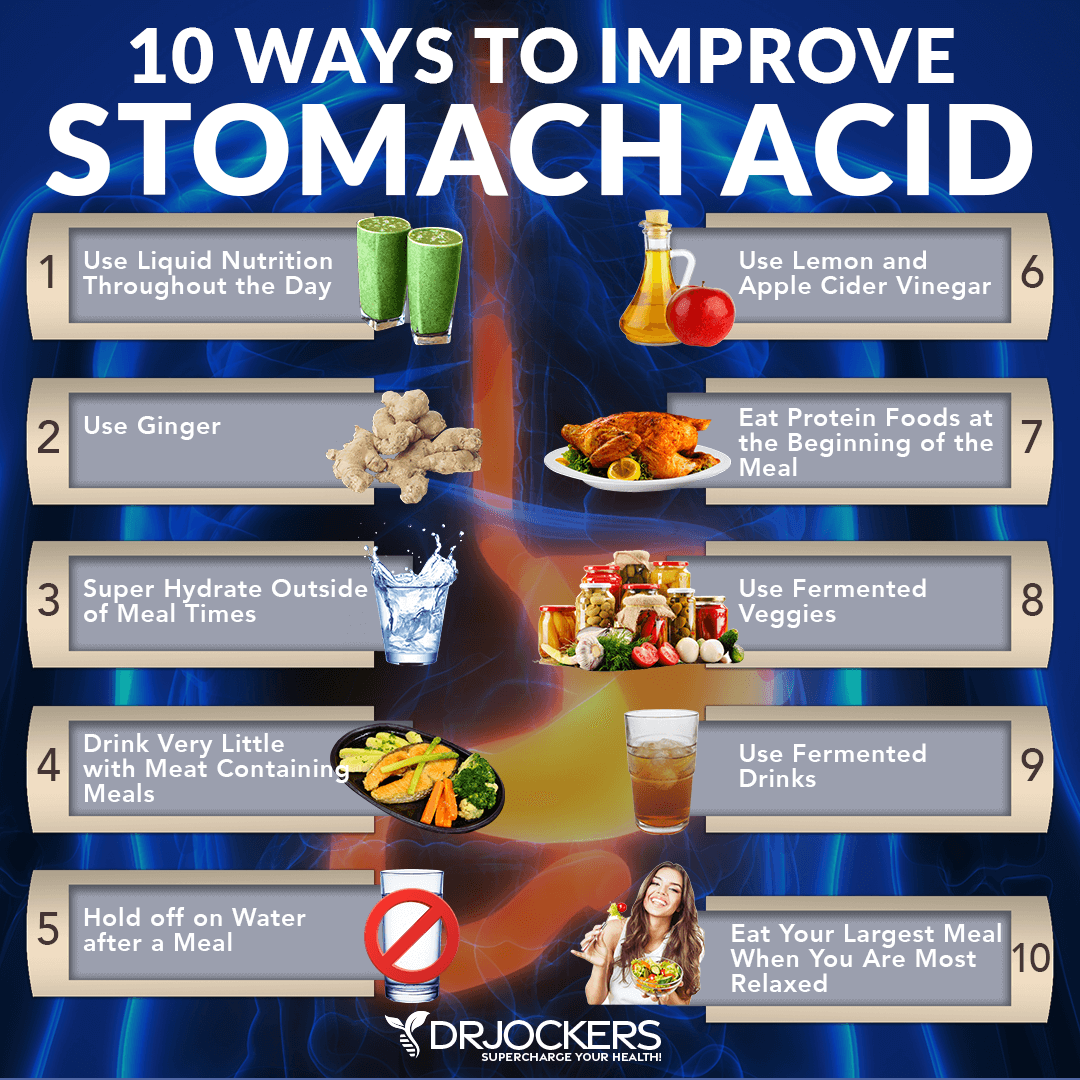
Additional Support
Using supplemental support for digestion (at least temporarily) is another great tool in the arsenal for helping to overcome constipation on keto. For this I typically recommend Acid Prozyme (HCL Support) and Super D-zyme (comprehensive enzyme support) or a combo called Super Digest HCL (HCL, ox bile and digestive enzymes).
This product is fantastic for supporting the digestive system and helping improve the digestion of fats and proteins by providing stomach acid, bile and pancreatic enzymes. I use this with individuals who have low stomach acid levels and poor bile flow.
Dehydration (Water + Minerals)
It has been known for a long time that poor hydration can increase the prevalence of constipation (3).
When your body shifts into a fat-burning metabolism, you retain less water and minerals. This means that you can become dehydrated if you are not making sure to hydrate extra well, contributing to constipation on keto.
One of the ways dehydration manifests is with poor bowel motility. Really the first three things you should think of when you have constipation are fiber, fats, and water (and minerals!).

Solution: Super Hydration & Minerals
We all struggle to consume enough water throughout the day. This is why I love implementing super hydration upon waking up in the morning.
Shoot to consume 16-32oz within the first hour of being awake to hydrate your body, flush out the kidneys, and stimulate a bowel movement first thing in the morning. Combining this practice with something like magnesium supplementation or a cup of coffee can be powerful to improve your energy levels and overcome constipation.

Changes in the Microbiome
When you cut out a large portion of carbs from your diet and replace them with healthy fats, this tends to alter your gut bacteria. The makeup of your gut bacteria can have an influence on the frequency of your elimination.
There is some exciting research showing that this alteration in the microbiome can be very beneficial for certain diseases including autism, multiple sclerosis, and infantile refractory epilepsy (4, 5, 6).
If constipation is being caused by an alteration in your dietary habits, then you will likely need to use supplemental magnesium and a high-quality probiotic to assist bowels movements and help assist in the positive shift going on with your gut bacteria.
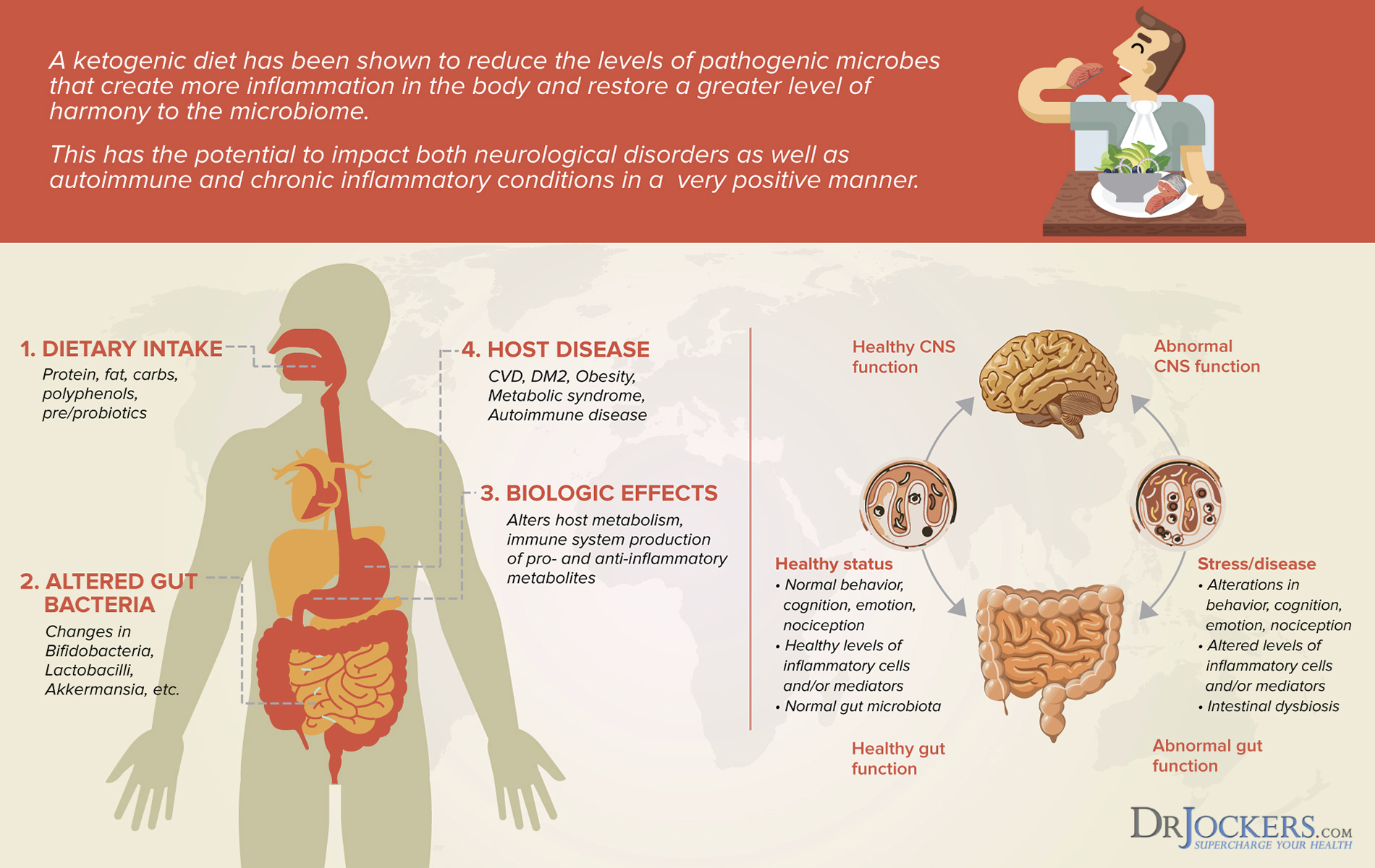
Solution: Fermented Foods & Probiotics
A ketogenic diet tends to have a beneficial impact on the gut microbiome by inhibiting the growth of unwanted bacteria and yeast while supporting healthy bacteria. Not everyone has a smooth transition here, however.
Consuming fermented foods and using a high quality probiotic supplement will help ensure your digestive tract flourishes with the right kinds of bacteria.
Some of my favorite fermented foods that are keto friendly include pickles, sauerkraut, kimchi, and coconut water kefir.
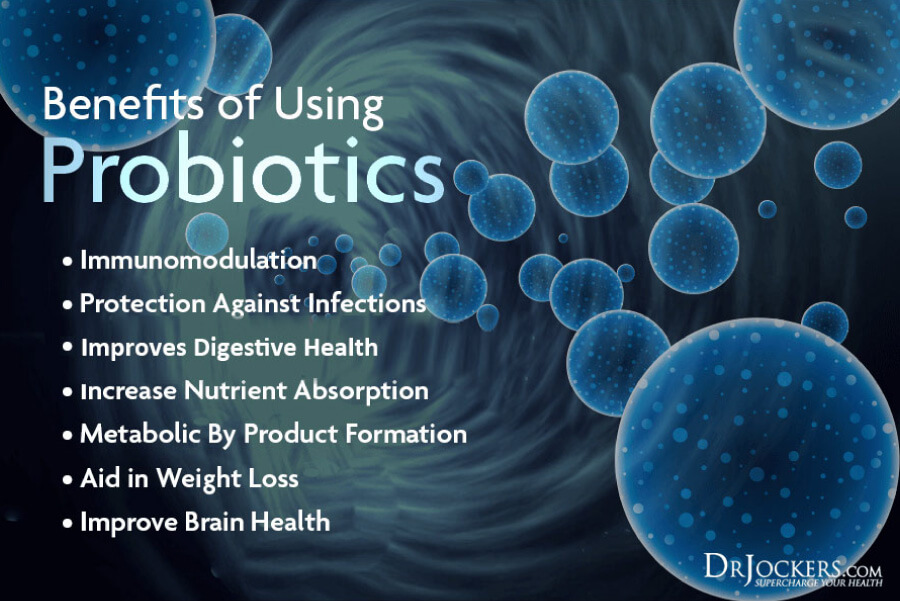
Eating too Much all at Once
A common practice with the ketogenic diet is intermittent fasting. I absolutely encourage intermittent fasting because it is a great way to boost your health in many different ways. Something that may be causing constipation on keto, however, is long periods of fasting followed by ravenous eating that puts a huge digestive load on the body all at once.
This sudden influx of food can be hard to digest, leading to constipation. In this case, the best thing to do would to either eat smaller meals or supplement with digestive support substances like apple cider vinegar, HCL, and enzymes.
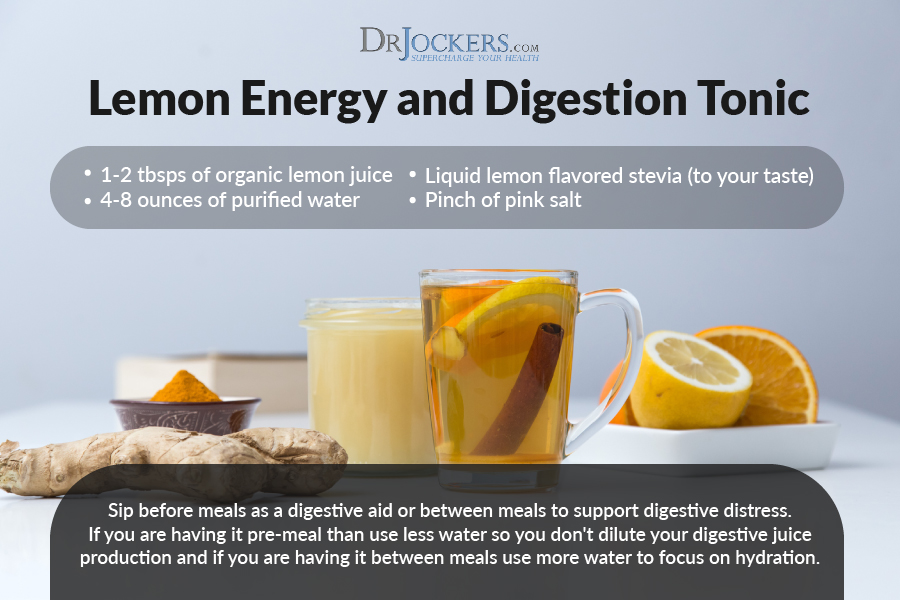
Solution: Smaller Meals
While intermittent fasting is definitely a great strategy to use on the ketogenic diet, try to avoid consuming massive meals all at once during your eating window. Instead space out 2-3 meals within a span of 6-10 hours with the largest of those meals being when you are in your most relaxed state. This is dinner time for most people.
Again, using digestive support strategies as outlined above can be very helpful to use around your largest meal of the day.
Using liquid nutrition during the day is a great idea as well. Here are some ideas to help guide you in formulating your perfect daytime smoothie:
Chocolate Coconut Keto Milkshake
SuperCharged Keto Chocolate Pudding
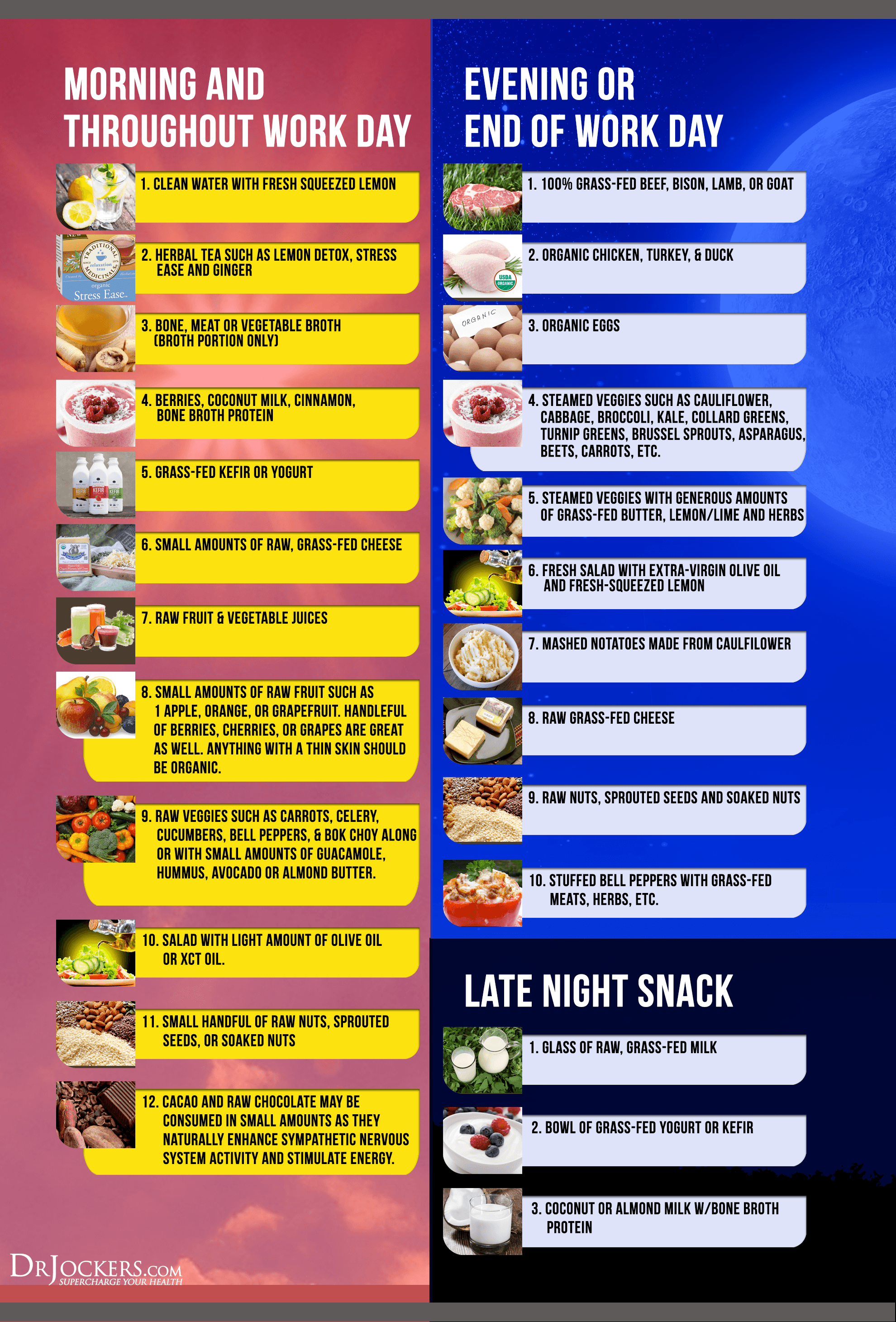
Too Much Stress
Being under a high amount of physical and emotional stress is not conducive to proper digestion. Your nervous system has two branches, the sympathetic and parasympathetic. The sympathetic is known as the stimulating branch that gets you ready to face immediate challenges (the fight or flight branch). It is activated when you are under stress and trying to accomplish the task at hand.
The parasympathetic branch is what controls relaxation and other important functions, such as digestion (known as the rest and digest branch). It is activated when you have no immediate stressors and are able to relax.
So,
Sympathetic= stimulation, body not focused on digestion
Parasympathetic= relaxation and proper digestion
If you are under constant stress and never have the opportunity to relax, you are much more likely to experience constipation on keto.
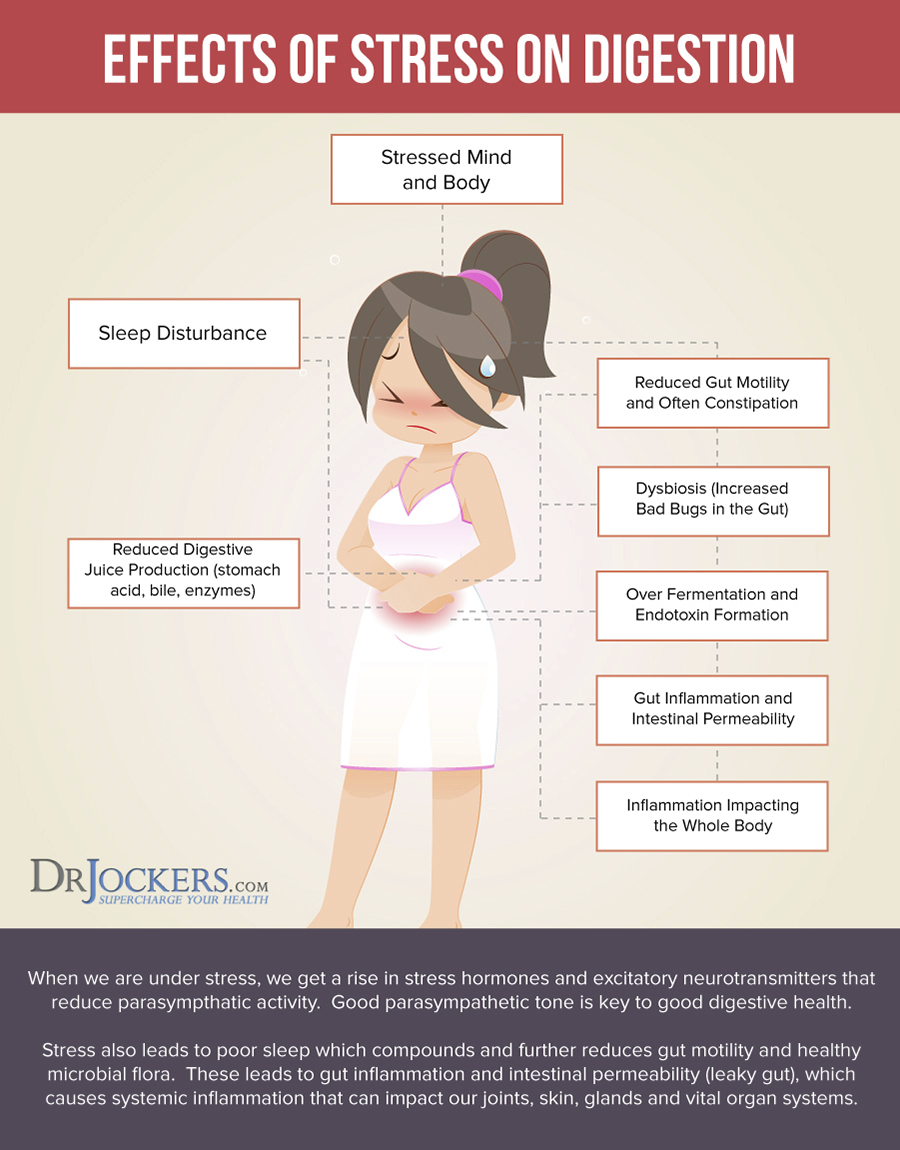
Solution: Improve Sleep & Balance Cortisol
If you are a highly stressed individual struggling with constipation on keto, you definitely need to employ strategies to reduce stress, balance cortisol levels, and optimize your sleep. These will be foundational for you to overcome constipation and really thrive in life.
Try to take time out of your day, especially when transitioning to new tasks, and breath. Take 6 deep breaths and make a mental note that you are now moving into a new task and you are mentally prepared to handle that task. This simple practice will go a long way to helping to control stress levels. To optimize your sleep, follow the guidelines in the graphic below:
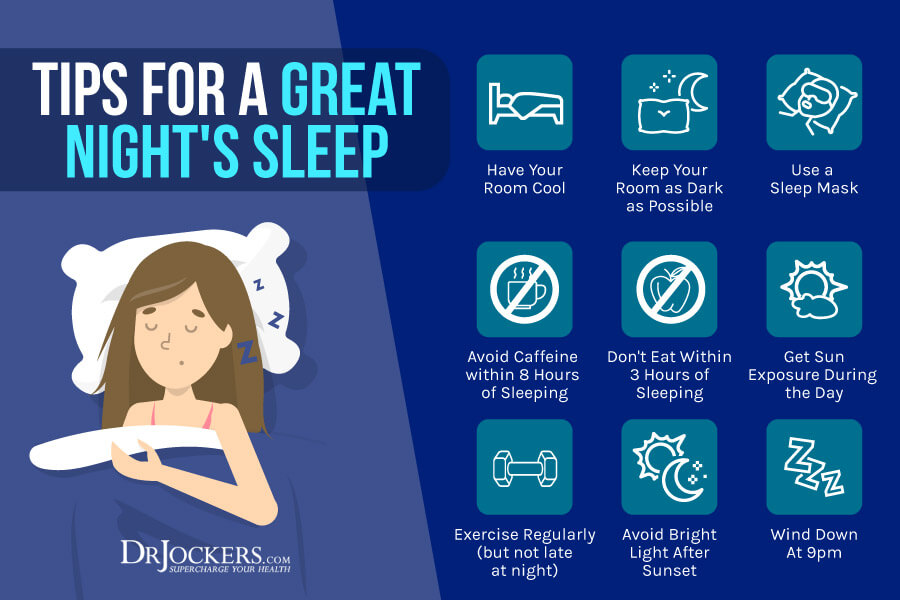
Eating Constipating Foods
Oftentimes, people will experience constipation on keto simply because they are eating too many constipating foods. These include cheeses, pasteurized dairy, nuts, and seeds. Eating too much dietary fiber can also be constipating.
From experience, people typically don’t need to cut back on dietary fiber, however, if they are consuming high amounts of dairy, nuts, and seeds, it may be a good idea to back off of those and focus on good hydration and getting plenty of fats.
Solution: Find Your Problem Foods
As was mentioned already, things like dairy, nuts, and seeds can be constipating for many people. Another thing to consider is that each person has their own unique food sensitivities that may be promoting inflammatory conditions in the digestive tract. These inflammatory conditions inhibit digestion and can be a hidden cause of constipation on keto.
Using a comprehensive food sensitivities panel or testing foods for yourself using any or all of the biofeedback testing methods below are all effective techniques to hone in on the best foods for you. For more thorough info on testing food sensitivities, check out this article and if you are looking for advanced strategies on overcoming food sensitivities, look at this article.
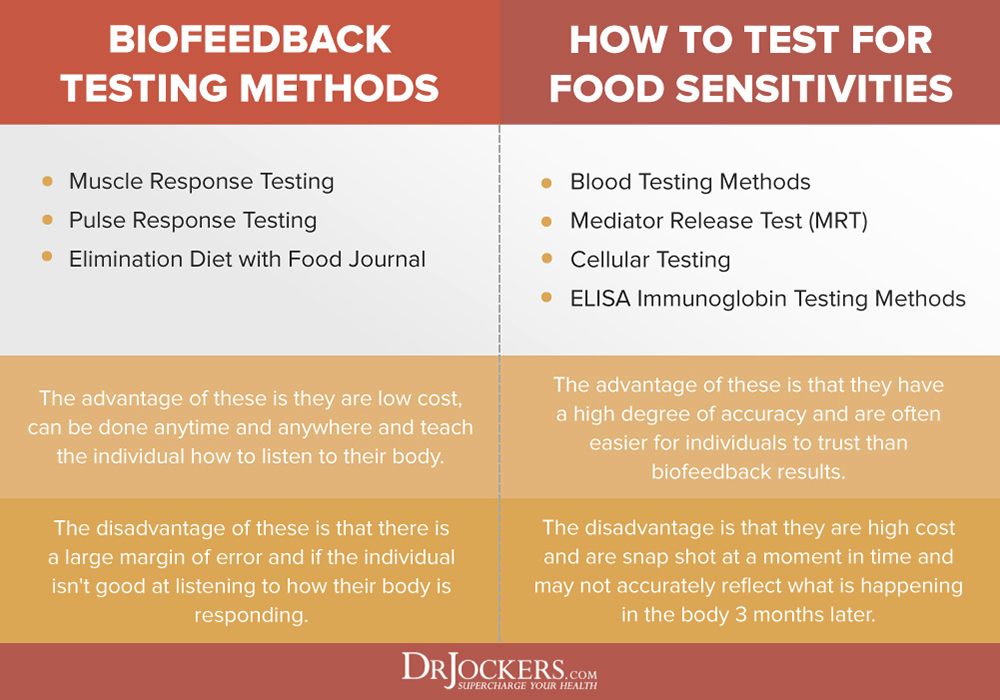
Immediate Constipation Relief
While the above strategies are effective and necessary to ensure you do not experience constipation on keto, sometimes it can be helpful to use strategies for immediate relief. There are a number of ways to stimulate a bowel movement and overcome constipation quickly.
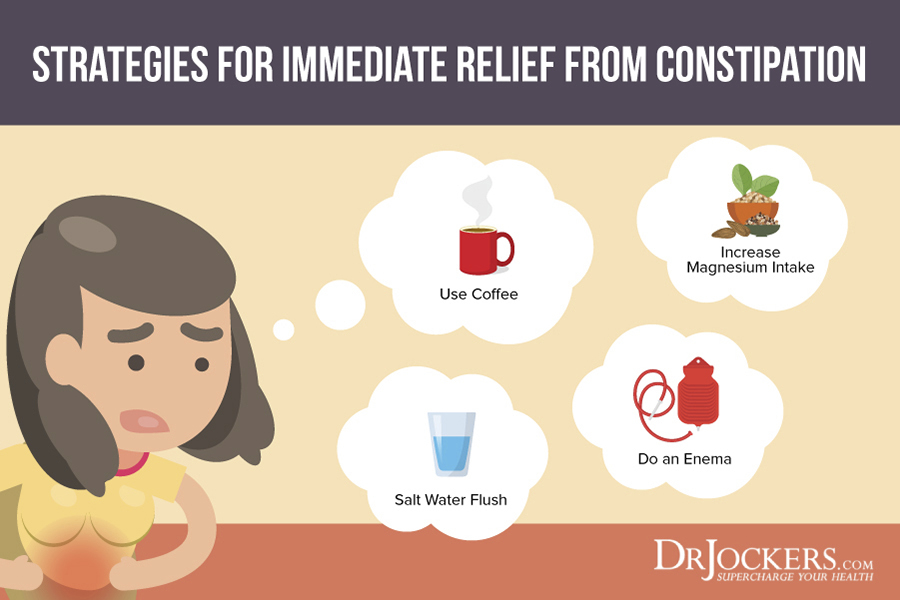
Coffee or Green Tea
We all know and love that morning cup of joe to help get things moving in the morning. If coffee isn’t enough to stimulate a bowel movement, try combining it with the super hydration technique mentioned above. This is a killer combination to overcome constipation and establish a morning bowel movement routine on a daily basis!
Not a fan of coffee than try matcha green tea which can also help stimulate gut motility and get you using the bathroom and it is packed full of powerful nutrients for your body! Additionally, adding some grass-fed butter and MCT oil to your coffee or tea can help to provide some healthy fats for further constipation relief.
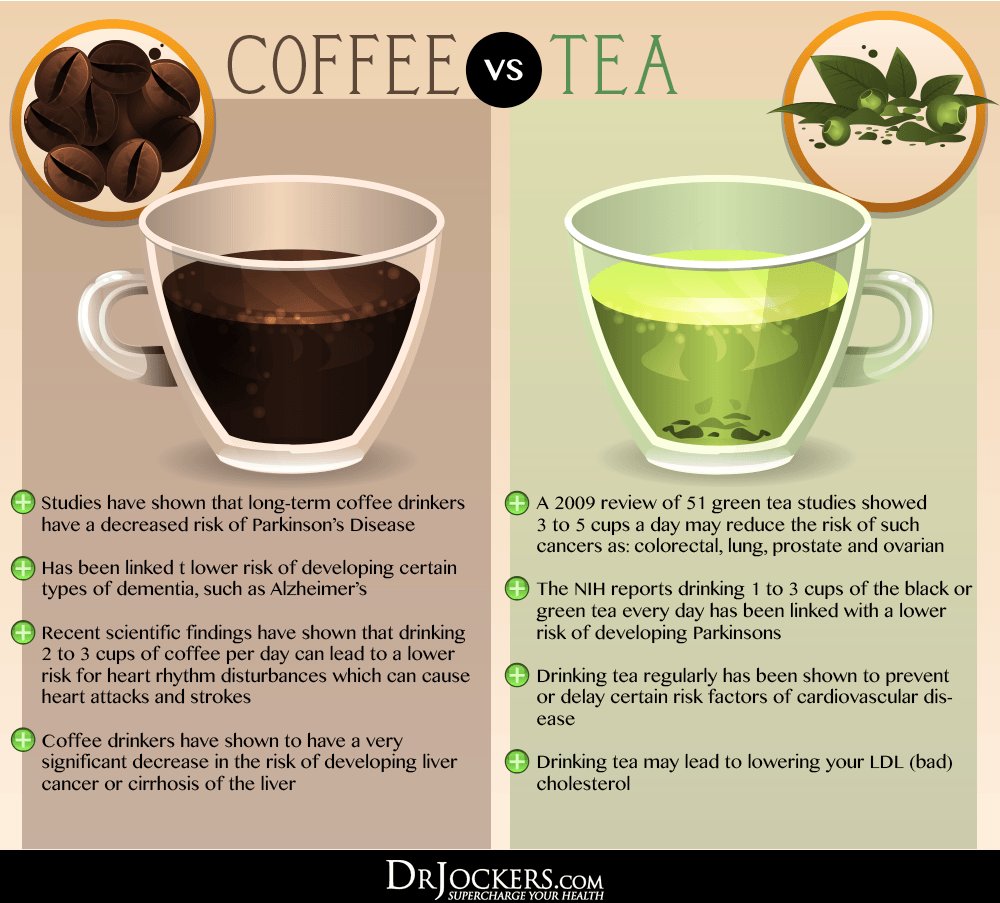
Magnesium
Almost everyone is deficient in magnesium. Used in hundreds of processes in the body, it is never a bad idea to supplement daily to top off your stores. The only side effect of consuming too much magnesium is loose stools.
If you are struggling with constipation, try mega dosing on magnesium. This will draw water into the colon while also relaxing the intestinal wall to support healthy elimination.
Again, stacking these techniques will provide extra benefit. Super hydrating first thing in the morning, consuming some magnesium, and following that up with your morning coffee should go a long way in providing immediate relief and helping you overcome constipation for good.
Enema
Okay so this may not be everyone’s favorite option, but it may be one of the most effective. Performing a coffee enema can help to flush out the colon when other strategies aren’t working. Outside of this immediate relief, coffee enemas actually have a wide range of benefits that can support healthy digestion and detoxification.
Especially for those who are having issues with a sluggish gallbladder, enemas help to stimulate bile flow. In the long term, this can support the effective digestion of fats to prevent associated constipation. For many people, doing a series of coffee enemas over a month period of time can reset their system and help them overcome constipation for good.
For more information on performing a coffee enema, read on in this article: Detoxify Your Body with Coffee Enemas
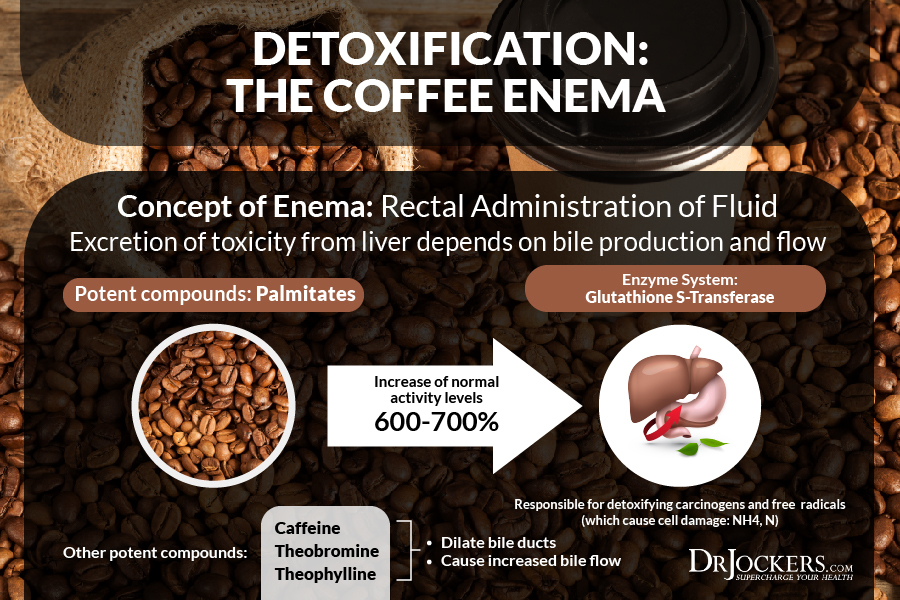
Sources for this Article Include
1. Zhao, Y., & Yu, Y.-B. (2016). Intestinal microbiota and chronic constipation. SpringerPlus, 5(1), 1130. https://doi.org/10.1186/s40064-016-2821-1
2. Paoli A, Rubini A, Volek JS, Grimaldi KA. Beyond weight loss: a review of the therapeutic uses of very-low-carbohydrate (ketogenic) diets. Eur J Clin Nutr. 2013;67(8):789-96. PMID: 23801097
3. Arnaud MJ. Mild dehydration: a risk factor of constipation?. Eur J Clin Nutr. 2003;57 Suppl 2:S88-95. PMID: 14681719
4. Newell C, Bomhof MR, Reimer RA, Hittel DS, Rho JM, Shearer J. Ketogenic diet modifies the gut microbiota in a murine model of autism spectrum disorder. Mol Autism. 2016;7(1):37. PMID: 27594980
5. Swidsinski A, Dörffel Y, Loening-baucke V, et al. Reduced Mass and Diversity of the Colonic Microbiome in Patients with Multiple Sclerosis and Their Improvement with Ketogenic Diet. Front Microbiol. 2017;8:1141. PMID: 28702003
6. Xie G, Zhou Q, Qiu CZ, et al. Ketogenic diet poses a significant effect on imbalanced gut microbiota in infants with refractory epilepsy. World J Gastroenterol. 2017;23(33):6164-6171. PMID: 28970732


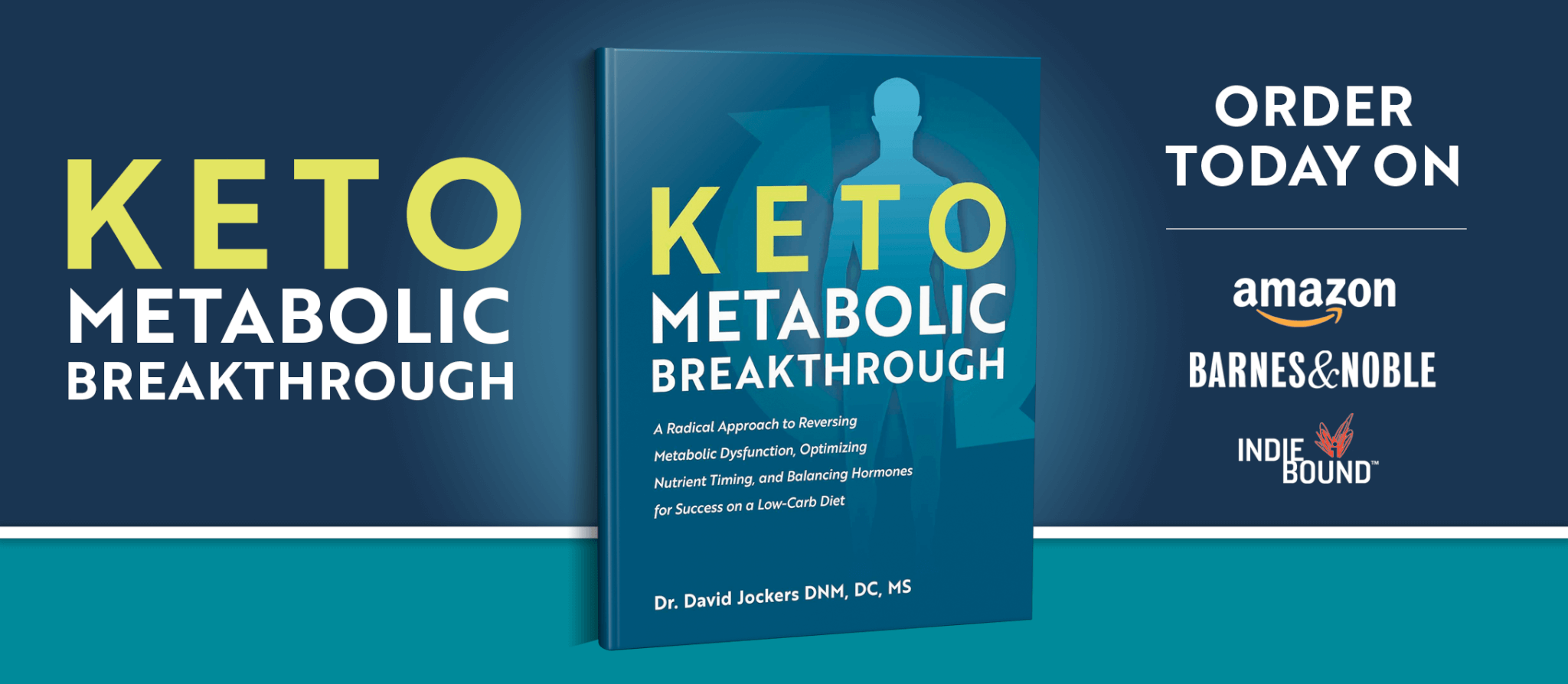


Dear Dr. Jockers,
thank You very much for presenting this thoroughly educating article.
Working as health coach with many clients having their struggles by strictly following nutrition and lifestyle advices, I appreciate your way of thinking.
Obstipation, gall bladder aching, or Skin reactions are just some of the symptoms my clients argue about – and Not all of them follow Kerto diets…
I Hope some of your advices and illustrations are helpful for deeper understanding to my clients.
Warm regards from Duesseldorf,
Germany
Yours,
Lars
Thank you for reading Lars! I hope it helps you and your clients!